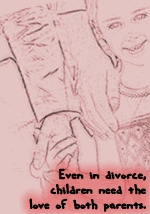Crisis of Character: Parental Alienation

In too many cases, the "child is used as a pawn" to harm, manipulate or persecute the other parent. The result of this destructive behavior is called Parental Alienation and "deprives children of their right to be loved by and showing love for both of their parents."
[Reprinted from the Parental Alienation Awareness website – www.parental-alienation-awareness.com]
What is Parental Alienation?
Parental alienation involves the mental manipulation of children with the purpose of destroying a loving and warm relationship they once shared with a parent.
Parental alienation and hostile aggressive parenting deprives children of their right to be loved by and showing love for both of their parents.
Parents/guardians using alienation tactics to hurt the other 'target' parent have been compared to cult leaders. These people put their own hatred, anger and motives before their own childs emotional and mental health. In effect, they treat their children as nothing more than possessions, and ammunition to hurt the 'target' parent.
Professionals argue whether Parental Alienation is a Syndrome or not. But they all agree that the problem exists and it's damaging to children, and can affect them into adulthood.
What is Parental Alienation Syndrome?
Parental alienation syndrome (PAS) is a psychological condition most often observed in children affected by high conflict divorce and/or separation. It is one of the most damaging outcomes affecting children as a result of exposure to Hostile-Aggressive Parenting. The most common symptom of children affected by PAS is their severe opposition to contact with one parent and/or overt hatred toward such parent when there is little and often, no logical reason to explain the child's behavior. The effects of PAS can last well into adulthood and may last for a lifetime with tragic consequences.
How does it happen?
During the crisis of divorce, most parents fear whether their children will emerge unscathed. Any reasonable and empathetic parent sincerely believes in the value of his or her children having a healthy relationship with both parents. Ideally, parents deliberately work on comforting and reassuring the children that no harm will come to them. At the same time, both try to strengthen their parent-child relationships without degrading the other parent or causing the children to feel divided loyalty. They encourage visits, talk kindly of the other parent in the children's presence, and set aside their own negative feelings to avoid causing the children distress. They are sensitive to the children's needs and encourage positive feelings toward the other parent. This outcome is the goal of not only the parents and children, but also the attorneys and judge involved in the case.
However, any number of events can destroy the fragile balance of peace between parents. If this happens, an injured parent may seek comfort by aligning with the children, especially since be or she may feel threatened by the children's love for the other parent. A pattern of alienation usually begins without any malicious or conscious intent to harm or destroy the relationship between the other parent and the children. Though most parents mean well, they are often unaware of how subtle behaviors and comments can hurt the relationship between the children and the targeted parent. Alienating parents however learn how to manipulate and use their children to hurt the other parent on purpose, and with a vengeance. This can include anything from outright telling the children their other parent does not love them and does not want to be with them, to destroying and hiding communication from the other parent, to simply refusing to act as a 'parent' when a child does not want to spend time with, or is rude to, the other, and empowering their child to do as they wish.
In 1994, approximately 2.4+ million North Americans obtained divorces, including the parents of more than one million children under the age of eighteen. Nearly as many unmarried couples with children will separate. Thanks to sky-high divorce rates and recent increases in the number and viciousness of child custody battles, there has been a marked increase in parental alienation. Children suffer from a breakup because they are torn, trapped, precariously balanced, as if one wrong move could cost them all their parents' love and acceptance. This can easily lead to disastrous effects on children. Various studies show that youngsters exposed to even mildly alienating behaviors may have trouble learning, concentrating, relaxing, or getting along with their peers. They have been known to develop physical symptoms and/or serious behavior problems. Clearly then, parental alienation is a threat to the mental and emotional health of a child.
Some early signs of Parental Alienation:
Simply put, the parents engaging in such behavior are un-fit, abusive parents,
putting their own emotional needs before those of their children.




0 Comments:
Post a Comment
<< Home